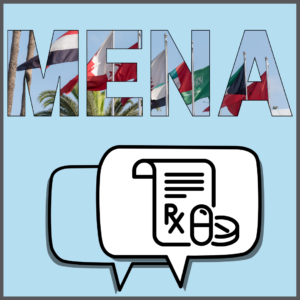
The serialization of pharmaceutical products in the MENA countries is becoming increasingly relevant. More and more countries are introducing their own legislation. The term MENA stands for Middle East and North Africa. Countries included are Algeria, Bahrain, Egypt, Iraq, Iran, Israel, Jordan, Kuwait, Lebanon, Libya, Malta, Morocco, Oman, Palestine, Saudi Arabia, Syria, Tunisia, and the United Arab Emirates. However, the individual regulations are anything but uniform. Information on some of these countries is already available on our website (see links above). We now add Egypt, Qatar, and Kuwait to this list.
The article focuses on providing regulatory information such as the title, the products concerned, and the relevant competent authority. We also present the code types of each country, as well as the timeframe in which the laws have been or will be introduced.
Pharma Serialization in Egypt
Title: Egyptian Pharmaceutical Track & Trace System (EPTTS)
Competent authority: Egyptian Drug Authority (EDA)
Products: All pharmaceutical products
Code type: GS1 – 2D DataMatrix
Aggregation: Not mandatory, but planned, based on SSCC (Serial Shipping Container Code) on tertiary packaging
Timeframe: Mandatory barcodes from June 2022, no data for serialization
Serialization of pharmaceuticals in Egypt is currently still in its infancy. At present, only a barcode is mandatory on all pharmaceutical products. This consists of a GTIN (Global Trade Item Number), the expiry date, the batch number, and a randomized serial number.
In January 2018, the Egyptian government announced its plans to introduce pharmaceutical serialization. The planned introduction of serialization and reporting was as early as June of the same year. At the time of the deadline, this ambitious target was downgraded to barcoding, which became mandatory in June 2022. A new deadline for serialization and reporting has not yet been published.
Pharma Serialization in Qatar
Competent authority: Hamad Medical Corporation (HMC)
Products: All pharmaceutical products supplied directly or through local distributors to Hamad Medical Corporation
Code type: GS1 – 2D DataMatrix or GS1-128
Aggregation: No
Timeframe: Several steps, starting in September 2019
Serialization is also being introduced in the Emirate of Qatar. The requirements for this will gradually increase in three stages. Starting in September 2019, packaging at the secondary and tertiary level will be labeled with GS1 DataMatrix or in GS1-128 format. In addition, the medicines are to be shipped together with the minimum product information in the form of an Excel file. These include:
- GTIN
- Product description (max. 35 characters)
- Dimensions width – length – height in metrics
- Weight in grams
- GTIN at the packaging level
- Number of next lower packaging
- Is the product tracked by batch (Yes/No)
- Is the product tracked by serial number (Yes/No)
- Storage conditions
- Image of the secondary packaging
In the next step, deliveries must be identifiable and tracked by the SSCC from January 1, 2021 onwards. The XML file contained in the code will also be sent to the HMC by email as soon as the delivery leaves the supplier.
The final phase itself has two phases. As of January 1, 2023, the GTIN is mandatory on primary packaging. In the second phase, which begins on January 1, 2025, the batch number and expiration date will be included.
Pharma serialization in Kuwait
Competent authority: Ministry of Health Kuwait
Products: All pharmaceutical products
Code type: GS1 – 2D DataMatrix
Aggregation: No
Timeframe: Labeling from January 1, 2024, onward
Starting January 1, 2024, all domestic and imported pharmaceutical products in Kuwait must be marked with a 2D DataMatrix in the GS1 standard. This code consists of a GTIN, the expiry date, the batch number, and a serial number. Product master data must be sent to GS1 Kuwait on January 1, 2023. Plans to introduce a national drug tracking system have not yet been published but are under discussion.
Serialization requirements in Libya
- Competent authority: Ministry of Economy and Commerce
- Products: All pharmaceutical products and medical devices
- Code type: GS1 – 2D DataMatrix
- Aggregation: No
- Timeframe: Labeling from the end of January 2024
Since January 2024, Decision No. 379 of 2023, adopted by the Ministry of Economy and Trade in Libya in mid-2023, has been effective. It stipulates that a GS1 DataMatrix code must be applied to pharmaceuticals and medical devices. The following must be applied to the second level of packaging
- Batch number
- Expiration date (only for pharmaceuticals)
- GTIN
- serial number
Serialization in other MENA countries is sure to follow in the future. In the meantime, if you are looking for a serialization provider for countries with existing regulations, please contact us here.
You can also take a look at our other articles dedicated to national regulations:
- Serialization in Australia
- Serialization in Canada
- Serialization in Kazakhstan
- Serialization in Argentina
- DSCSA in the United States
This information is only one possible interpretation of the regulations. They are also in a constant state of change, so the information in this article may be incomplete or out of date. The above article is expressly no legal advice. Please refer to the official documents for information before making any business decisions. (Status of information: December 2023, Libya April 2024)